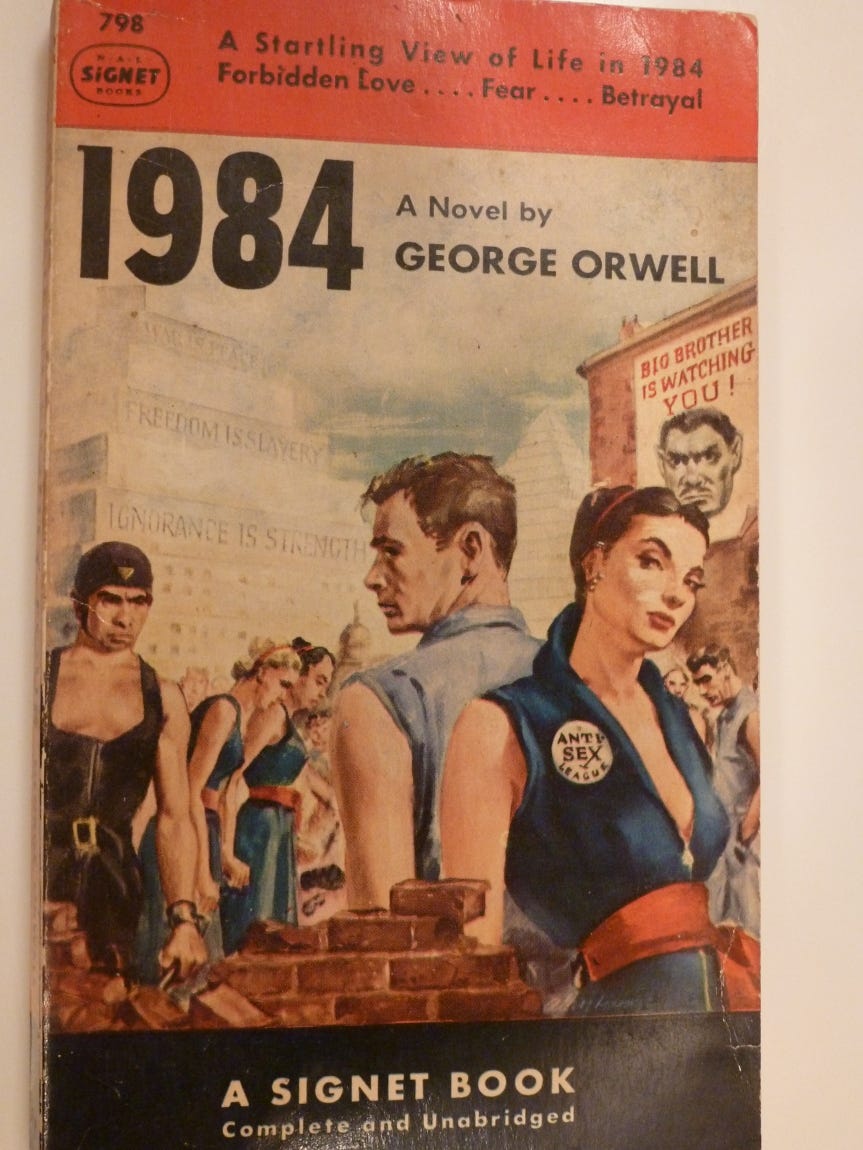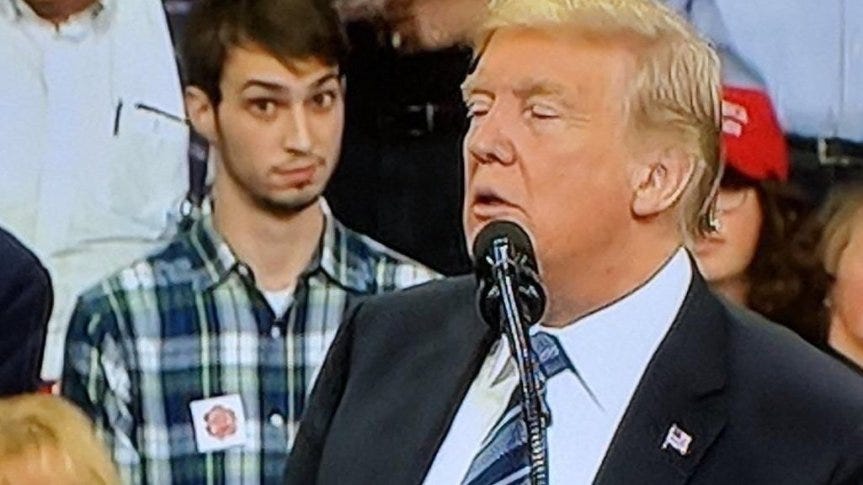Dystopia USA
America as a Kluge of Ray Bradbury, Aldous Huxley, and George Orwell
A couple of my keen-eyed readers have been talking about George Orwell and Aldous Huxley, which made me recall this piece I wrote on dystopias from 2016. And then I thought of another piece I wrote in the Trump era on “facecrime,” one of my favorite pieces from an absurdist point of view. So I’ve posted both pieces below and welcome your comments on them. Thanks.
This Modern and Dystopic World (2016)
W.J. Astore
The modern world is a kluge of Ray Bradbury’s Fahrenheit 451 with screens everywhere in which people submerge themselves, Aldous Huxley’s Brave New World with “soma” of all sorts to keep us drugged and happy, and of course George Orwell’s 1984 with constant surveillance and the “two minutes of hate,” directed mainly at “the enemy,” especially the enemy within, known in 1984 as Goldstein (for some Americans today, “Goldstein” is Donald Trump; for others, it’s Hillary Clinton; for a few, it’s Ted Cruz or perhaps all of the above).
Dystopic elements characterize our American moment, hence the appropriateness of dystopic science fiction novels. Bradbury was especially good at poking holes in the idea technology was in essence a liberating force. He captured the way people might submerge their identities within screens, neglecting the real people around them, even those closest to them, for the “virtual reality” of infotainment. Huxley was keen to debunk mass production as a liberating force, but his invention of “soma,” a mood-enhancing drug that leads to detachment and inaction, captured our overly medicated ways. (I can’t watch network news without being bombarded by drug ads that promise me release from pain or acne or other nuisances and hence a better life, as long as I take this pill or use this inhaler.) Finally, Orwell captured the total surveillance state, one driven by fear, obsessed by enemies created by the state to cow the masses. Perhaps the darkest of the three, Orwell left little hope for the “little man” oppressed under the jackboot of a militaristic and totalitarian state.
The times are not quite that dark in America today, but these three classic novels offer warnings we’d do well to heed. An aspect of these dystopias we most definitely see in America today is the degeneration of news, of information, of knowledge. As a society, America is arguably less fact-based today than at any point in its history. Even as we’re immersed in information via the Internet, the news itself has become shallower, or trivial, or frivolous, when it’s not out-and-out propaganda.
I grew up watching the news. Before going to school, I used to watch the “Today” show in the morning in the 1970s. It was a decent show. Some real and serious news made the cut. Now it’s largely a laugh-fest featuring celebrities making sales-pitches. The news as soap opera; the news as vanity.
To state the obvious: The network “news” has been dumbed down. Image is nearly everything. Stories are far shorter and without context. Designed for people with limited attention spans, they’re also designed to keep people watching, so they feature sensationalism and “quick hits” — nothing too taxing or disturbing.
Of course, the real news is still out there, as Tom Engelhardt notes in his latest probing article at TomDispatch.com. It’s just much harder to find on the network “news”:
What’s left out? Well, more or less everything that truly matters much of the time: any large, generally unphotogenic process, for instance, like the crumbling of America’s infrastructure (unless cameras can fortuitously zoom in on a bridge collapsing or a natural gas pipeline in the process of blowing up in a neighborhood — all so much more likely in an age in which no imaginable situation lacks its amateur video); poverty (who the hell cares?); the growing inequality gap locally or globally (a no-interest barrier the WikiLeaks-style Panama Papers recently managed to break through); almost anything that happens in the places where most of the people on this planet actually live (Asia and Africa); the rise of the national security state and of militarism in an era of permanent war and permanent (in)security in the “homeland”; and don’t even get me started on climate change…
Coming to grips with the real news would require thought and necessitate action – changes, radical ones, to the status quo. And what powerbroker wants that?
Focus instead, America, on your screens. Take your soma. Hate your Goldstein. That’s the method driving our madness. Dystopia, anyone?
Facecrime! (2018)
W.J. Astore
We’re truly living in Orwellian times. A 17-year-old high school student, now known as #plaidshirtguy due to his choice of wardrobe, was removed from a Trump rally in Montana because of the faces he was making as Trump spoke. You can read all about here, and watch an interview with him at CNN.
Not surprisingly, people who stand behind Trump are selected ahead of time and told to clap and cheer. This young man did that, but he also chose to look quizzical, skeptical, and bemused at times. This is not allowed! A Trump staffer eventually intervened to remove him from the audience due to his “face crime.” To make matters worse, he was then held by the Secret Service for ten minutes, after which he was asked to leave the event.
Leave the event? For making skeptical and quizzical facial expressions?
You may recall from George Orwell’s “1984” that “Facecrime” existed. Anyone making skeptical or otherwise unacceptable faces when the Party announced bogus victories, production figures, and so forth opened himself or herself up to serious punishment.
Thanks to plaid shirt guy, we now know that facecrime has come to America. Just remember, fellow citizens, always to smile and cheer in the presence of Our Dear Leader. Unless you want to be detained and sent away — perhaps next time to the cornfield.
*From my copy of “1984”: “In any case, to wear an improper expression on your face (to look incredulous when a victory was announced, for example) was itself a punishable offense. There was even a word for it in Newspeak: facecrime, it was called.” (From the end of Chapter 5.)





Speaking of soma, more than one million Americans have died of drug overdoses in the last 20 years, most of those from the opioid epidemic.
Huxley, I think, saw soma as a safe tranquilizer. We've done him one better by making it a mass killer, which is consistent with dystopia.
"Coming to grips with the real news would require thought... "
But that's an anathema to corporate media. A thinking public is the worst threat they could face. Much better to keep them amused or emotionally aroused.